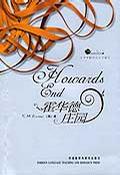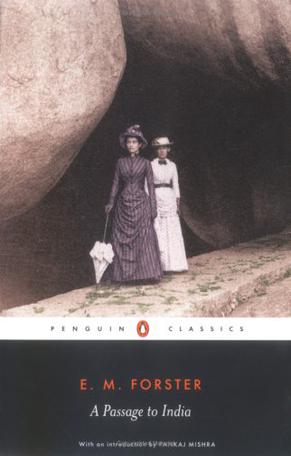-

Howards End
A meticulously-observed drama of class warfare, E.M. Forster's "Howards End" explores the conflict inherent within English society, unveiling the character of a nation as never before. This "Penguin Classics" edition includes an introduction and notes by David Lodge. 'Only connect...' A chance acquaintance brings together the preposterous bourgeois Wilcox family and the clever, cultured and idealistic Schlegel sisters. As clear-eyed Margaret develops a friendship with Mrs Wilcox, the impetuous Helen brings into their midst a young bank clerk named Leonard Bast, who lives at the edge of poverty and ruin. When Mrs Wilcox dies, her family discovers that she wants to leave her country home, Howards End, to Margaret. Thus as Forster sets in motion a chain of events that will entangle three different families, he brilliantly portrays their aspirations to personal and social harmony. David Lodge's introduction provides an absorbing and eloquent overture to the 1910 novel that established Forster's reputation as an important writer, and that he himself later referred to as 'my best novel'. This edition also contains a note on the text, suggestions for further reading, and explanatory notes. E. M. Forster (1879-1970) was a noted English author and critic and a member of the Bloomsbury group. His first novel, "Where Angels Fear To Tread" appeared in 1905. "The Longest Journey" appeared in 1907, followed by "A Room With A View" (1908), based partly on the material from extended holidays in Italy with his mother. "Howards End" (1910) was a story that centered on an English country house and dealt with the clash between two families, one interested in art and literature, the other only in business. "Maurice" was revised several times during his life, and finally published posthumously in 1971. If you enjoyed "Howard's End", you might like Forster's "A Room with a View", also available in "Penguin Classics". -

A Passage to India
Among the greatest novels of the twentieth century and the basis for director David Lean’s Academy Award-winning film, A Passage to India tells of the clash of cultures in British India after the turn of the century. In exquisite prose, Forster reveals the menace that lurks just beneath the surface of ordinary life, as a common misunderstanding erupts into a devastating affair. -

Maurice
Set in the elegant Edwardian world of Cambridge undergraduate life, this story by a master novelist introduces us to Maurice Hall when he is fourteen. We follow him through public school and Cambridge, and on into his father's firm, Hill and Hall, Stock Brokers. In a highly structured society, Maurice is a conventional young man in almost every way, "stepping into the niche that England had prepared for him": except that his is homosexual. Written during 1913 and 1914, immediately after "Howards End," and not published until 1971, " Maurice" was ahead of its time in its theme and in its affirmation that love between men can be happy. "Happiness," Forster wrote, "is its keynote. In "Maurice" I tried to create a character who was completely unlike myself or what I supposed myself to be: someone handsome, healthy, bodily attractive, mentally torpid, not a bad businessman and rather a snob. Into this mixture I dropped an ingredient that puzzles him, wakes him up, torments him and finally saves him." 注:该书有3个封面内容完全一致,货品随机发送 -

Howards End
Review: With a new Introduction by James Ivory Commentary by Virginia Woolf, Lionel Trilling, Malcolm Bradbury, and Joseph Epstein Howards End is a classic English novel . . . superb and wholly cherishable . . . one that admirers have no trouble reading over and over again," said Alfred Kazin. First published in 1910, Howards End is the novel that earned E. M. Forster recognition as a major writer. At its heart lie two families--the wealthy and business-minded Wilcoxes and the cultured and idealistic Schlegels. When the beautiful and independent Helen Schlegel begins an impetuous affair with the ardent Paul Wilcox, a series of events is sparked--some very funny, some very tragic--that results in a dispute over who will inherit Howards End, the Wilcoxes' charming country home. As much about the clash between individual wills as the clash between the sexes and the classes, Howards End is a novel whose central tenet, "Only connect," remains a powerful prescription for modern life. "Howards End is undoubtedly Forster's masterpiece; it develops to their full the themes and attitudes of [his] early books and throws back upon them a new and enhancing light," wrote the critic Lionel Trilling. E. M. Forster (1879-1970) began writing stories while at Cambridge University. He is the author of Where Angels Fear to Tread (1905), A Room with a View (1908), Howards End (1910), and A Passage to India (1924). His novel Maurice, about a homosexual love affair, was published posthumously in 1971. James Ivory is an American film director and is best known for the films he has made of E. M. Forster's novels, including Howards End, which enjoyed immense critical and popular success. He lives in New York City. Howards End is a novel of ideas, not brute facts; in many respects it is an old kind of novel, playful in the eighteenth-century sense, full of tenderness toward favorite characters in the Dickens style, inventive in every structural touch but not a modernist work. Amazon.com Margaret Schlegel, engaged to the much older, widowed Henry Wilcox, meets her intended the morning after accepting his proposal and realizes that he is a man who has lived without introspection or true self-knowledge. As she contemplates the state of Wilcox's soul, her remedy for what ails him has become one of the most oft-quoted passages in literature: Only connect! That was the whole of her sermon. Only connect the prose and the passion and both will be exalted, and human love will be seen at its height. Live in fragments no longer. Like all of Forster's work, Howards End concerns itself with class, nationality, economic status, and how each of these affects personal relationships. It follows the intertwined fortunes of the Schlegel sisters, Margaret and Helen, and the Wilcox family over the course of several years. The Schlegels are intellectuals, devotees of art and literature. The Wilcoxes, on the other hand, can't be bothered with the life of the mind or the heart, leading, instead, outer lives of "telegrams and anger" that foster "such virtues as neatness, decision, and obedience, virtues of the second rank, no doubt, but they have formed our civilization." Helen, after a brief flirtation with one of the Wilcox sons, has developed an antipathy for the family; Margaret, however, forms a brief but intense friendship with Mrs. Wilcox, which is cut short by the older woman's death. When her family discovers a scrap of paper requesting that Henry give their home, Howards End, to Margaret, it precipitates a spiritual crisis among them that will take years to resolve. Forster's 1910 novel begins as a collection of seemingly unrelated events--Helen's impulsive engagement to Paul Wilcox; a chance meeting between the Schlegel sisters and an impoverished clerk named Leonard Bast at a concert; a casual conversation between the sisters and Henry Wilcox in London one night. But as it moves along, these disparate threads gradually knit into a tightly woven fabric of tragic misunderstandings, impulsive actions, and irreparable consequences, and, eventually, connection. Though set in the early years of the 20th century, Howards End seems even more suited to our own fragmented era of e-mails and anger. For readers living in such an age, the exhortation to "only connect" resonates ever more profoundly. From AudioFile An audiobook cannot be satisfactory unless the reader understands the text completely. In the case of a complex and subtle work like Howard's End , that's no small order. Edward Petherbridge does understand and makes all clear to the listener with unaffected authority. At the same time, he achieves such transparency that one forgets one is listening to a performance and simply experiences the story. His delivery is flawless. The story may not appeal to everyone, but the reading won't disappoint. J.N. Book Dimension Height (mm) 180 Width (mm) 110 -

霍华德庄园
《霍华德庄园》小说象征结构的中心是一所被称为“霍华德庄园”的房子,它与书中主要女性人物密切关联,代表着与传统农业相联系、根植于家乡土地并与大自然和谐共处的生存方式,也代表着古老英国的土地资产和精神传统。 外国文学经典--原汁原味的英语,适合英语专业大中专生及英语阅读爱好者 安徒生童话 苔丝 哈克贝利·费恩历险记 呼啸山庄 红字 名利场(上下) 爱玛 远离尘嚣 傲慢与偏见 绿野仙踪 小公主 傲慢与偏见 福尔摩斯探案集1:血字的研究 四签名 福尔摩斯探案集2:福尔摩斯历险记 福尔摩斯探案集3:福尔摩斯回忆录 福尔摩斯探案集4:福尔摩斯归来 福尔摩斯探案集5:巴斯克维尔的猎犬 恐怖谷 福尔摩斯探案集6:福尔摩斯的最后致意 福尔摩斯探案集7:福尔摩斯新探案 汤姆·索亚历险记 雾都孤儿 雾都孤儿 劝导 艰难时世 茶花女 外国文学经典:鲁滨逊漂流记 复活 月亮宝石 双城记 小妇人 茶花女 远大前程 远大前程 红与黑 海底两万里 汤姆·索亚历险记 绿野仙踪 绿野仙踪 复活 包法利夫人 海底两万里 基督山伯爵(套装全3册) 红与黑(英文原版) 三个火枪手(套装上下册) 战争与和平(套装全3册) 诺桑觉寺 安徒生童话 大卫科波菲尔(英文版) 小妇人 包法利夫人 远大前程 远离尘嚣 爱玛 名利场 名利场 卡斯特桥市长 二十世纪外国文学精选 简·萨默斯的日记 宠儿(二十世纪外国文学精选) 霍华德庄园 夜色温柔 纯真年代 看不见的人 占有 日瓦戈医生 日瓦戈医生 走出非洲 城堡 宠儿 洛丽塔 看不见的人 洛丽塔(英文版) 日瓦戈医生 看不见的人 了不起的盖茨比 了不起的盖茨比——20世纪百部最佳小说之一、青年人必读的经典小说 大师经典文库 理想国(英文) 马可波罗游记:英文 乌托邦(英文) 培根论说文集(英文) 忏悔录:英文 梦的解析(英文) 道德经(汉英对照) 论语(汉英对照) 孙子兵法 中国人的精神 宽容(英文) 人类的故事 中国的文艺复兴 中国人的精神(英文版) 人类的故事(英文版 房龙著) 梦的解析(英文版)(弗洛伊德著) 理想国 马可波罗游记 乌托邦 培根论说文集 忏悔录 道德经 论语 宽容 中国的文艺复兴(英汉对照) 轻松英语名作欣赏:大话名人 浪漫史诗:鲍蒂卡女王 风云际会:莎士比亚 身后疑云:图坦卡蒙 乱世传奇:圣女贞德 群雄逐鹿:拿破仑 另类成长故事:达尔文 学问人生:爱因斯坦 -

A Passage to India
When Adela and her elderly companion Mrs Moore arrive in the Indian town of Chandrapore, they quickly feel trapped by its ins ular and prejudiced British community. Determined to explore the real India', they seek the guidance of the charming and mercurial Dr Aziz, a cultivated Indian Muslim. But a mysterious incident occurs while they are exploring the Marabar caves with Aziz, and the well-respected doctor soon finds himself at the centre of a scandal that rouses violent passions among both the British and their Indian subjects. A masterly portrait of a society in the grip of imperialism, A Passage to India compellingly depicts the fate of individuals caught between the great political and cultural conflicts of the modern world.